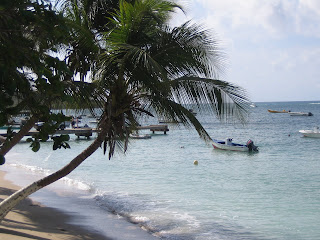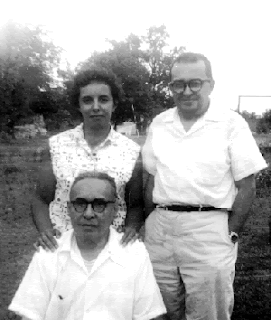
Behind the scenes of this blog several people and I have been doing extensive research into the origins of the Caban family BEFORE they came to Puerto Rico. This has been a question I've seen on most every genealogy site where the Caban name can be found. People are either looking for current family OR they are asking the question, "Where did the family come from?" It's kind of funny, because you never see it asked about surnames like Rodriguez, or Jimenez, or Jones, or MacDonald...
So that is the big question: Where did the Cabans come from?
And here is the answer, as much as we researchers have been able to piece together:
The Cabans originated in Languedoc-Roussillon, in what was once the kingdom of Occitania, but is now the Pyrenees area of Southern France and Northern Spain. (In fact it is only about 50 miles between Carcassonne and Barcelona!) The Occitan language is still alive, as are customs and the culture, if you are interested to know further. The name Caban is a French word for "overcoat" but it was believed to have been Cabanne or Cabannis originally.
The Caban name was not found in Puerto Rico prior to the 1800s. In fact, as you see from my mini-family tree, the earliest one listed is Juan Caban, who was born circa 1790. There is nothing any further back than that. And here is why...
The Cabans came to Puerto Rico as part of the Royal Decree of Graces of 1815. Wikipedia explains that Spain had lost all of its territory in the Americas and was in danger of losing Cuba and Puerto Rico. "Free land was offered to those who wanted to populate the islands with the condition that they swear their loyalty to the Spanish Crown and allegiance to the Roman Catholic Church".
Because Europe was experiencing a series of Revolutions and life was so unstable, "Hundreds of Corsicans, Italians, French , Irish and Germans, attracted by the offers of free land by the Spanish Crown, moved to the colonies of Cuba and Puerto Rico and accepted the conditions stated. As soon as these settlers swore their loyalty to the Spanish Crown and their allegiance to the Roman Catholic Church, they were given a "Letter of Domicile".
After five years, the settlers were granted a "Letter of Naturalization" that made them Spanish subjects. In an effort to attract non-Catholic Europeans, the Spanish Courts passed a law in 1870, granting the right of religious freedom to all those who wished to worship another religion other than the Catholic. "
There have been tracings of the Cabans to Ireland as well (Cavan county!) but again there was a lot of migration between the European countries over the centuries, so this does not necessarily make us Irish.
In any case, the Cabans came as part of the Royal Decree of Graces and it's not hard to think that a man named "Jean Cabanne" could easily change the "E" in his first name to a "u" and drop the "ne" at the end of Cabanne. So Jean Cabanne becomes Juan Caban. It's done by immigrants all the time.
The Cabans did have huge plantations in PR. Here is what happened to it, according to Carl Diaz, son of Gloria Caban Diaz (the oldest of our family alive):
"As the Spanish American War came to a close, the brothers (Roque, Bonifacio, Florentino & Rafael) along with their parents who were “Loyalists” (being Spaniards by heritage & nationality) were in jeopardy.
The local freedom “guerilla” fighters called “La Banda Pendiciosa” targeted their father’s plantation and were coming to burn it along with those of other loyalists.
The story goes that my mother’s grandfather Roque had escaped into the caves since he was being hunted in reprisal for his efforts to fight against the guerillas and the “American Liberators”. His fate was pretty much assured. He was to face execution if captured.
The remaining three brothers stayed with their families at the plantation.
On the “Night of the Burnings” – as it came to be called – all the family members, wives, children and their servants and loyal peasants etc. gathered together and began a prayer vigil.
The next morning they found all nearby plantations destroyed and the fields burned. They miraculously escaped the fires and their plantation was spared!
Roque eventually re-appeared 3 months later after the fighting was over and the search for him had been abandoned.
The Americans had taken over the island, the Spaniards had left, the peasants had been reorganized and eventually the lands and property were “socialized”…"


